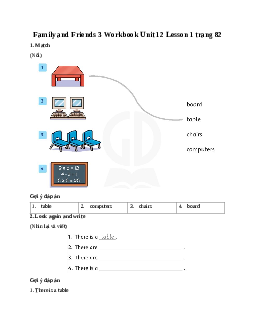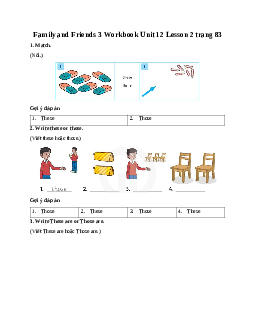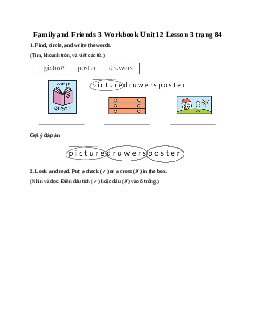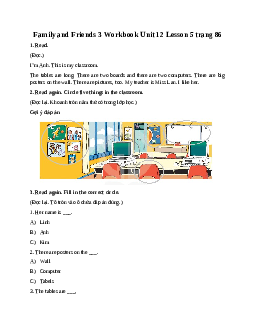









Preview text:
ĐỀ THI THỬ THPTQG MÔN TIẾNG ANH
PHÁT TRIỂN ĐỀ MINH HỌA CÓ ĐÁP ÁN
Mark the letter A, B, C, or D on your answer sheet to indicate the word whose underlined part differs from the other three in pronunciation in each of the following questions.
Question 1: A. cell B. coach C. come D. cook
Question 2: A. soft B. note C. close D. comb
Mark the letter A, B, C, or D on your answer sheet to indicate the word that differs from the other three in the position of primary stress in each of the following questions.
Question 3: A. urban B. intact C. legal D. early
Question 4: A. appearance B. requirement C. position D. livelihood
Mark the letter A, B, C, or D on your answer sheet to indicate the correct answer to each of the following questions.
Question 5: The singer is _________than the dancer.
- the most talkative
B. more talkative
C. as talkative
D. talkative
Question 6: Most of the employees in the company couldn’t _________ the point of joining further training courses in August.
A. take
B. see
C. mind
D. have
Question 7: The successful applicant for the _________ will be a well-motivated self-starter who has excellent communication skills.
A. situation
B. position
C. condition
D. location
Question 8: The postcards _________ to you as soon as you arrive in London.
A. will send
B. will be sent
C. sent
D. have sent
Question 9: The children _________ football happily in the yard when a boy suddenly cried out.
A. have played
B. are playing
C. played
D. were playing
Question 10: They invited architects _________ their designs for a new shopping mall.
A. submitting
B. to submitting
C. submit
D. to submit
Question 11: _________, we will take her to our favourite seafood restaurant.
A. When Sandra was visiting us this coming weekend
B. When Sandra will visit us this coming weekend
C. When Sandra visited us this coming weekend
D. When Sandra visits us this coming weekend
Question 12: Squid Game is not appropriate for kids under the age of 17, _________.
A. doesn’t it
B. isn’t it
C. is it
D. does it
Question 13: The theory_________ by Albert Einstein is still widely accepted.
A. proposed
B. proposes
C. was proposed
D. proposing
Question 14: Red is the symbol of danger because it _________ among other colours.
A. stands out
B. stands by
C. takes off
D. settles down
Question 15: Because of the _________ and the power of their numbers, these organizations command deep loyalty from the workers.
A. habit
B. routine
C. manner
D. tradition
Question 16: I think that up to now there has not been a real _________ between men and women.
A. equality
B. equal
C. equally
D. equalize
Question 17: Can you give me _________ piece of paper, please?
A. ∅ (no article)
B. an
C. a
D. the
Question 18: Many people in Britain are fond _________ doing the gardening
A. of
B. about
C. in
D. for
Question 19: My father has turned over a new _________and he is not smoking anymore.
A. leaf
B. branch
C. flower
D. book
Mark the letter A, B, C, or D on your answer sheet to indicate the option that best completes each of the following exchanges.
Question 20: Peter is talking to Jack about his homework.
- Peter: This homework is really hard. Can you help me, Jack?
- Jack: _________. I’ve just finished it.
A. Don’t mention it
B. Sorry
C. Sure
D. I’d like to
Question 21: Suri is talking to her roommate about the Olympic Games.
- Suri: Do you think our country can host the Olympic Games some day in the future?
- Kate: ______ . We can’t afford such a big event.
A. You can say that again
B. Yes, you’re right
C. I can’t agree with you more
D. No, I don’t think so
Mark the letter A, B, C, or D on your answer sheet to indicate the word(s) CLOSEST in meaning to the underlined word(s) in each of the following questions.
Question 22: She wondered if the diverse butterflies she saw in the yard were among the species her dad had imported.
A. colorful
B. beautiful
C. different
D. similar
Question 23: Sarah is very outgoing; however, her brother is quite reserved. He rarely shows his feelings or thoughts to others.
A. calm
B. open
C. shy
D. gentle
Mark the letter A, B, C, or D on your answer sheet to indicate the word(s) OPPOSITE in meaning to the underlined word(s) in each of the following questions.
Question 24: Our pianist had fallen ill, and then, at the eleventh hour, when we thought we'd have to cancel the performance, Jill offered to replace him.
- at midnight
- at the first moment
C. at the last moment
D. at the end
Question 25: Basically, everything is the same; however, there may be some minor changes to the schedule.
A. major B. slight C. small D. gradual
Mark the letter A, B, C, or D on your answer sheet to indicate the sentence that is closest in meaning to each of the following questions.
Question 26: "Why did you quit your job?" asked the interviewer.
A. The interviewer asked me why did I quit my job.
B. The interviewer asked me why I had quit your job.
C. The interviewer asked me why had I quit my job.
D. The interviewer asked me why I had quit my job.
Question 27: She started working for this company many years ago.
A. She has started working for this company for many years
B. She has been working for this company for many years.
C. She hasn’t worked for this company for many years.
D. She didn’t work for this company for many years.
Question 28: My parents don’t allow me to stay up late watching TV.
A. I needn’t stay up late watching TV.
B. I don’t have to stay up late watching TV.
C. I mustn’t stay up late watching TV.
D. I shouldn’t stay up late watching TV.
Mark the letter A, B, C, or D on your answer sheet to indicate the underlined part that needs correction in each of the following questions.
Question 29: Many parents are concerned about the health hazards of having his children spend so many hours staring at a screen.
A. staring
B. his
C. concerned
D. hazards
Question 30: As soon as I will finish this project, I’ll take a vacation to relax.
A. As soon as
B. take
C. will finish
D. to relax
Question 31: After Peter left school, he had the narrowest escape possible of intruding himself into another place of accommodation for distinguishable people.
A. narrowest
B. accommodation
C. possible
D. distinguishable
Mark the letter A, B, C, or D on your answer sheet to indicate the sentence that best combines each pair of sentences in the following questions.
Question 32: The train arrived at the station. Shortly after that the passengers rushed towards it.
A. No sooner had the train arrived at the station than the passengers rushed towards it.
B. Hardly had the passengers rushed towards the train when it arrived at the station.
C. Scarcely had the passengers rushed towards the train when it arrived at the station.
D. Not until the passengers rushed towards the train did it arrive at the station.
Question 33: She eats out all the time. She can’t save much money.
A. She could save a lot of money if she ate out all the time.
B. She could have saved much money if she hadn’t eaten out all the time.
C. She can’t save much money unless she eats out all the time.
D. She could save so much money if she did not eat out all the time.
Read the following passage and mark the letter A, B, C, or D on your answer sheet to indicate the correct word or phrase that best fits each of the numbered blanks from 34 to 38.
Miracle liquid
There is a long and rich history of using honey as medicine, especially in ancient times. Some
records show that people have used honey as a balm, an inebriant, a psychoactive substance, or as a poison.
Multiple contemporary studies suggest that honeys from honeybees and stingless bees have antimicrobial, anti-inflammatory, and wound-healing (34) _________ .
Stingless bees make honey with chemicals (35) _________ ward off microbial and fungal growth, an adaptation to keep the substance from spoiling in the tropics. Given the wide variety of plant biodiversity in the Amazon, and the incredible range of botanical chemicals the bees mix into their honeys and wax, it’s also no surprise it has medicinal value. Indeed, some call such honey a miracle liquid.
Already, people in the tropics use (36) _________ types of stingless bee honeys and wax from their hives to treat upper respiratory infections, skin conditions, gastrointestinal problems, and even to treat diabetes and cancer. (37) _________ research has begun providing a hint of support for some of these uses, much of it is still preliminary. More investigations into the honey’s medicinal benefits is (38) _________ needed, says David Roubik, an expert on stingless bees at the Smithsonian Tropical Research Institute in Panama.
Question 34: A. qualifications B. properties C. distinctions D. skills
Question 35: A. who B. whose C. which D. when
Question 36: A. every B. another C. others D. many
Question 37: A. Though B. However C. Moreover D. Because
Question 38: A. questionably B. urgently C. blissfully D. doubtingly
Read the following and mark the letter A, B, C, or D on your answer sheet to indicate the correct answer to each of the questions from 39 to 43.
When he was nine years old, Felix Finkbeiner gave a class presentation on climate change. The
young German spoke about deforestation and its effect on the planet. At the end of his talk, he challenged the people of his country to help by planting one million trees. Nobody thought much would come of a nine-year-old’s school project. Before he was 20, however, Finkbeiner’s efforts had resulted in the planting of more than 14 billion trees around the world.
Finkbeiner and his classmates began the project - named ‘Plant-for-the-Planet’ - by planting the first tree outside their school. Other schools followed the example, and news of the one-million challenge spread.
As a result, Finkbeiner was asked to speak at the European Parliament. Other invitations soon followed, and when he was just 13, he spoke at a United Nations conference in New York. “We cannot trust that adults alone will save our future,” he said in the speech. “We have to take our future in our hands.” Finkbeiner is now in his twenties, and Plant-for-the-Planet is an organization with around 70,000 members. It works to teach people about climate change and to encourage the planting of more trees.
Germany’s one millionth tree was planted long ago. The goal now is one trillion - 150 for every person on Earth.
(Adapted from Reading Explorer by Becky Tarver Chase and David Bohlke)
Question 39: What is the reading mainly about?
A. The problems that deforestation can cause for our planet
B. The effects climate change has on our planet
C. How planting trees can help the environment
D. How a young person has made a big difference to the environment
Question 40: According to paragraph 2, what happened to Finkbeiner after his “Plant-for-the -Planet” project had a widespread impact?
A. He discussed the problem of climate change with world leaders.
B. He made a presentation at a United Nations conference in New York.
C. He received an offer to make a speech at the European Parliament.
D. He had to confront many challenges.
Question 41: In the third paragraph, what does the word It refer to?
A. “Plant-for-the-Planet” organization
B. Germany's one millionth tree
C. Climate change
D. Goal
Question 42: The word deforestation in paragraph 1 is CLOSEST in meaning to ______
A. the increase of temperature
B. the planting of trees
C. the cutting down of trees
D. the decrease of temperature
Question 43: Which of the following is NOT true according to the passage?
A. Felix Finkbeiner delivered a class presentation on climate change.
B. “Plant-for-the-Planet” encourages people to plant more trees.
C. Germany’s one trillionth tree was planted when Felix was nine years old.
D. The first tree of the project was planted outside Felix’s school.
Read the following passage and mark the letter A, B, C, or D on your answer sheet to indicate the correct answer to each of the questions from 44 to 50.
Over the last several decades, environmental specialists have proposed various strategies aimed at slowing down this process of deforestation in developing countries. Many of these proposals are indeed valuable ideas in that they are realistic attempts to address some of the causes of deforestation, such as farming, cattle ranching, and commercial logging. All of them rely on government involvement of some kind.
There are three broad categories of solutions: state economic policies, internal agreements, and
international programs. Economic policies generally attempt to limit the activity of small farmers through government action. Government actions can include the clear proper definition and enforcement of property
rights, meaning that squatting, or illegally setting on land, would be more difficult. Subsidies can be used to encourage conservation. That is, money may be paid to supplement the income of those farmers who make an effort to reduce the usual amount of damage to the forest that their farms cause. In addition, taxes
can act as a deterrent to undesirable land use.
An internal agreement may be made between governments and indigenous or native people living in the moist rainforests and open woodlands of the tropics, where the vast majority of this deforestation is occurring. Such an agreement would allow people to carry on traditional activities adapted for some economic benefit.
Finally, international agreements usually involve the exchanges of monetary aid in return for
government action to protect its forests. One such plan seeks to help pay a nation’s debt in exchange for restrictions on certain kinds of activities in rainforests. Instead of selling logging concessions to pay down that obligation, the government receives money for banning or restricting logging in its forests. There is also the proposal of a global fund created in order to grant money to countries that choose to protect their environments.
It is clear that something must be done to protect the forests of the world. If the current rate of
deforestation continues, the world’s rainforests will vanish within 100 years, causing numerous adverse effects on the global climate and eliminating the majority of plant and animal species on the planet.
(Adapted from Mastering skills TOEFL IBT Advanced)Question 44: What is the passage mainly about?
A. Suggestions for indigenous peoples and governments to modern environmental situations.
B. Several plans for minimizing the adverse environmental effects of deforestation.
C. Environmental experts have been concerned about the impact of deforestation.
D. Governments should provide economic incentives for responsible land use.
Question 45: The word them in paragraph 1 refers to ______.
A. the causes of deforestation
B. decades
C. developing countries
D. proposals
Question 46: The word deterrent in paragraph 2 is closest in meaning to ______.
A. punishment
B. incentive
C. hindrance
D. improvement
Question 47: According to paragraph 4, an international agreement is ______.
A. between countries B. more effective than an internal agreement
C. among indigenous groups D. in state economic policies
Question 48: The word vanish in paragraph 5 is closest in meaning to ______.
A. disappear
B. develop
C. flourish
D. remain
Question 49: Which of the following is NOT true according to the passage?
A. All of the proposals count on government participation.
B. State economic policies can be one of three broad categories of solutions.
C. Internal agreements are likely to help poor countries to pay national debt.
D. Government can offer subsidies to enhance preservation.
Question 50: Which of the following can be inferred from the passage?
A. State economic policies are more effective than international agreements.
B. Indigenous people in the tropics depend on forestry to make money.
C. The three types of solutions mentioned will save the rainforests.
D. Deforestation is not a very serious problem.
ĐÁP ÁN




